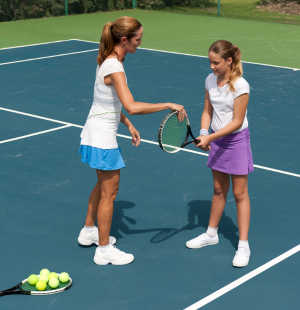
Finding the Right Coach
👨🏫 What to Look for—and What Matters—in Your Child’s Tennis Coach
Choosing the right tennis coach is a very important decision in your child’s development, not just as a player but as a person. The coach will shape how your child learns, approaches challenges, handles success and failure, and ultimately grows through the game of tennis.
At FOFTA, we believe the right coach focuses on long-term development, not quick wins or short-term results. That means helping your child grow in all four key areas of the game: technical, physical, strategic, and mental. It also means prioritizing character, effort, and emotional maturity just as much as stroke mechanics or match performance.
A development-minded coach understands that every child progresses at their own pace. They’re committed to building solid foundations, teaching life skills through sport, and fostering a lasting love for the game, regardless of rankings or trophies.
The goal isn’t just to find someone who can teach strokes. It’s to find someone who can build a player for the long run—and partner with your family to guide that journey with knowledge, purpose, and care.

✅ 1. Look for a Developmental Approach, Not Just Results
The best coaches focus on long-term growth, not quick wins.
Signs of a development-focused coach:
- Uses progressive drills and stage-appropriate techniques
- Emphasizes footwork, consistency, and mental habits
- Teaches players how to think and problem-solve, not just follow instructions
- Understands the ROGY (Red, Orange, Green, Yellow) progression and applies it properly
- Views success as improvement, not just tournament results
📌 Avoid coaches who chase results at the expense of player development, enjoyment, or emotional health.
🧠 2. Prioritizes Communication and Connection
A great coach knows how to connect with kids, not just correct them.
Look for someone who:
- Communicates clearly, positively, and consistently
- Encourages questions and dialogue
- Provides feedback that builds confidence and accountability
- Makes the learning process enjoyable and purposeful
The coaching relationship should feel safe and encouraging, especially for beginners or players still building confidence.
🧭 3. Understands the Whole Player
The right coach recognizes that tennis is more than strokes—it’s a blend of:
- Technical skill
- Physical development
- Strategic thinking
- Mental toughness
Ask if the coach integrates all four pillars into their training. Do they also emphasize sportsmanship, resilience, and attitude? A great coach helps shape the player—and the person.
🤝 4. Fits Your Family’s Values and Philosophy
Every coach has a different style. Some are highly competitive and structured, others are more developmental and nurturing.
Consider:
- Does the coach’s philosophy align with your values?
- Are they focused on effort, character, and growth?
- How do they handle losing, tough days, or a lack of motivation?
At FOFTA, we believe coaching should reflect faith, hope, goal setting, sports science, and a strong work ethic. A coach who supports those principles will reinforce what you’re teaching at home.
🔍 5. Watch a Lesson Before You Commit
Before jumping in, observe a lesson:
- Are the players engaged and learning?
- Is the coach giving equal attention to all students?
- Do kids leave the court motivated, not overwhelmed?
- Is there a balance between correction, repetition, and encouragement?
📌 Your child should walk away feeling like they belong on the court—even if they made mistakes.
📣 Questions to Ask a Potential Coach
- What’s your coaching philosophy for junior players?
- How do you balance competition and development?
- How do you handle setbacks or frustration in young players?
- How do you communicate with parents?
- What role do you expect parents to play in the development process?
🏁 Final Thought: Coaching is a Partnership
The right coach doesn’t replace the parent—they partner with the parent to support the child. You should feel confident in the direction, pace, and purpose of your child’s training. And your child should feel excited to learn, improve, and grow—on and off the court.
“A good coach teaches tennis. A great coach inspires growth.”
